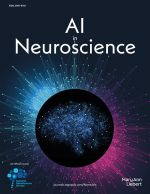
AI in Neuroscience
AI in Neuroscience is a multidisciplinary peer-reviewed research journal dedicated to exploring the relationship between artificial intelligence (AI) and neuroscience. Broad in scope, the journal aims to publish high-quality peer-reviewed content concerning the application of artificial intelligence (AI) methods to all areas of neuroscience, including clinical, cognitive and behavioral, computational, systems, and molecular and cellular neuroscience. By fostering collaboration and knowledge exchange, the journal seeks to advance understanding, develop new technologies, and address current challenges and opportunities.
Topics of Interest:
Computational Neuroscience: Investigating neural dynamics, models and simulations of the nervous system, information processing, and brain function using computational models and AI techniques.
Neuroimaging and AI: Developing AI-driven methods for analysis, interpretation, and visualization of neuroimaging data from techniques such as MRI, EEG, fMRI, and MEG.
Neuroinformatics: Integrating AI tools and techniques for managing, analyzing, and sharing large-scale neuroscience data, including genomic, connectomic, and behavioral data; Explore insights into gene expression, protein function, and cellular signaling in the nervous system.
Brain-Computer Interfaces (BCIs): Advancing the design and application of BCIs for communication, control, and neurorehabilitation through AI algorithms.
Machine Learning in Neuroscience: Exploring machine learning algorithms for pattern recognition, classification, prediction, and feature extraction in neuroscience datasets.
AI-driven Neuroscience Therapeutics: Investigating the potential of AI for drug discovery, treatment optimization, and personalized medicine in neurological and psychiatric disorders.
Cognitive Neuroscience and AI: Exploring AI-driven approaches to understanding cognitive processes, decision-making, learning, memory, and consciousness.
Ethical and Societal Implications: Examining ethical, legal, and societal implications of AI applications in neuroscience, including issues of privacy, bias, and autonomy.
AIN publishes original research articles, reviews, descriptions of new published datasets and code, commentaries, and perspectives across the spectrum of laboratory investigations, translational research, and clinical practice. Submissions employing diverse methodologies, including computational modeling, experimental neuroscience, data science, and translational research, are encouraged.
Our goal is to facilitate interdisciplinary dialogue and collaboration to harness the potential of AI in revealing the complexities of the brain and advancing both neuroscience and AI fields.
Audience: Neuroscientists, neuroimaging specialists, neurologists, neurobiologists, neurosurgeons, neuropsychologists, bioengineers, AI researchers, and industry professionals in pharmaceuticals, biotechnology, healthcare technology, and AI.
| Esther Yuh, MD, PhD | University of California San Francisco, San Francisco, CA, USA |
| Zhaolin Chen, PhD | Monash University, Victoria, Australia |
| Amy Kuceyeski, PhD | Weill Cornell Medicine, Ithaca, NY, USA |
| Alex Leow, MD, PhD | University of Illinois, Chicago, IL, USA |
| Yuanning Li, PhD | Shanghaitech University, Shanghai, China |
| Ravi K Madduri, MS | Argonne National Laboratory, Lemont, IL, USA |
| Pratik Mukherjee, MD, PhD | University of California, San Francisco, CA, USA |
| Mario Senden, PhD | Maastricht University, Limburg, Netherlands |
| Michele Svanera, PhD | University Of Glasgow, Glasgow, United Kingdom |
| Qiyuan Tian, PhD | Tsinghua University, Beijing, China |
| Fan Zhang, PhD | University Of Electronic Sci And Technology Of China, Sichuan, China |